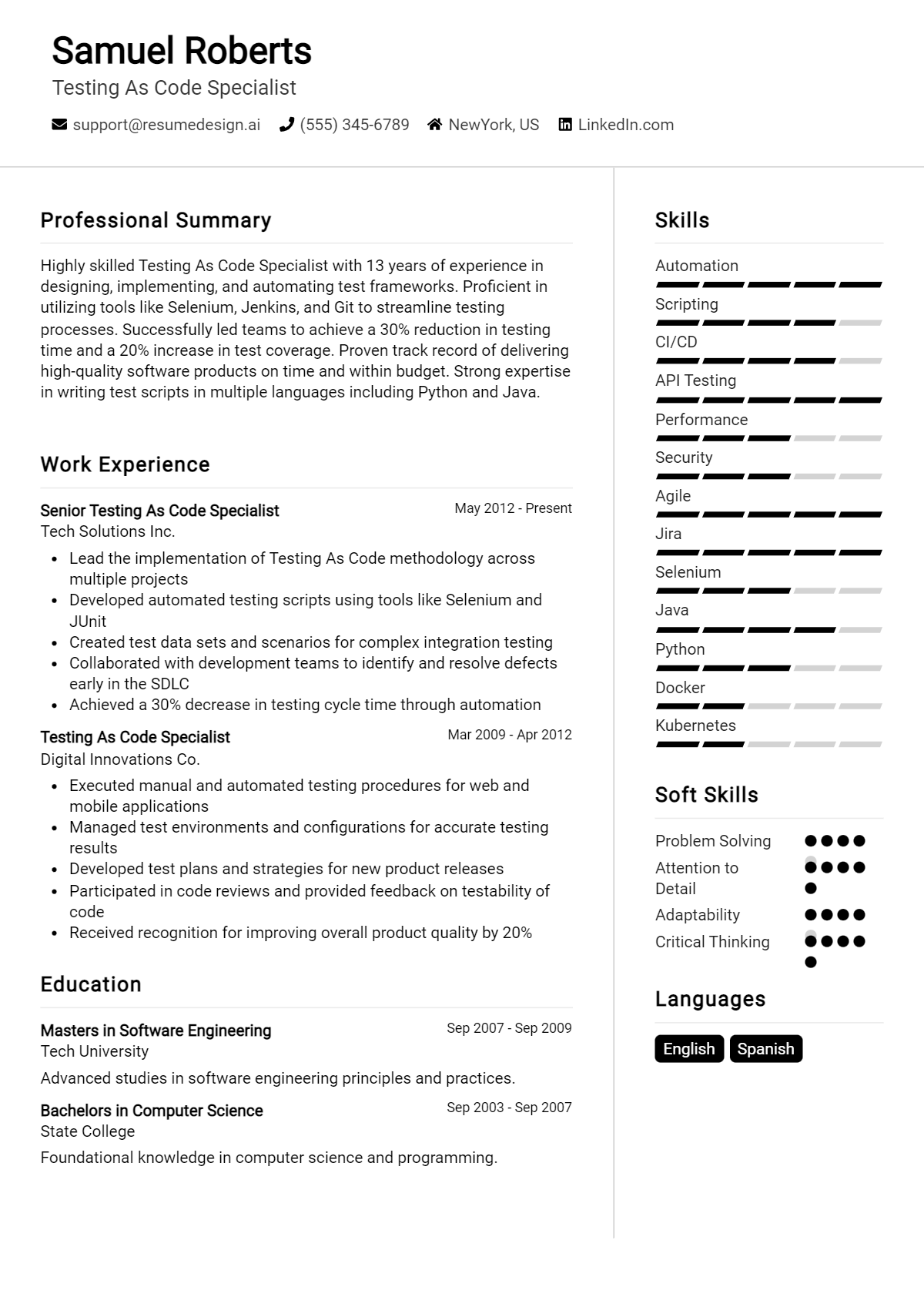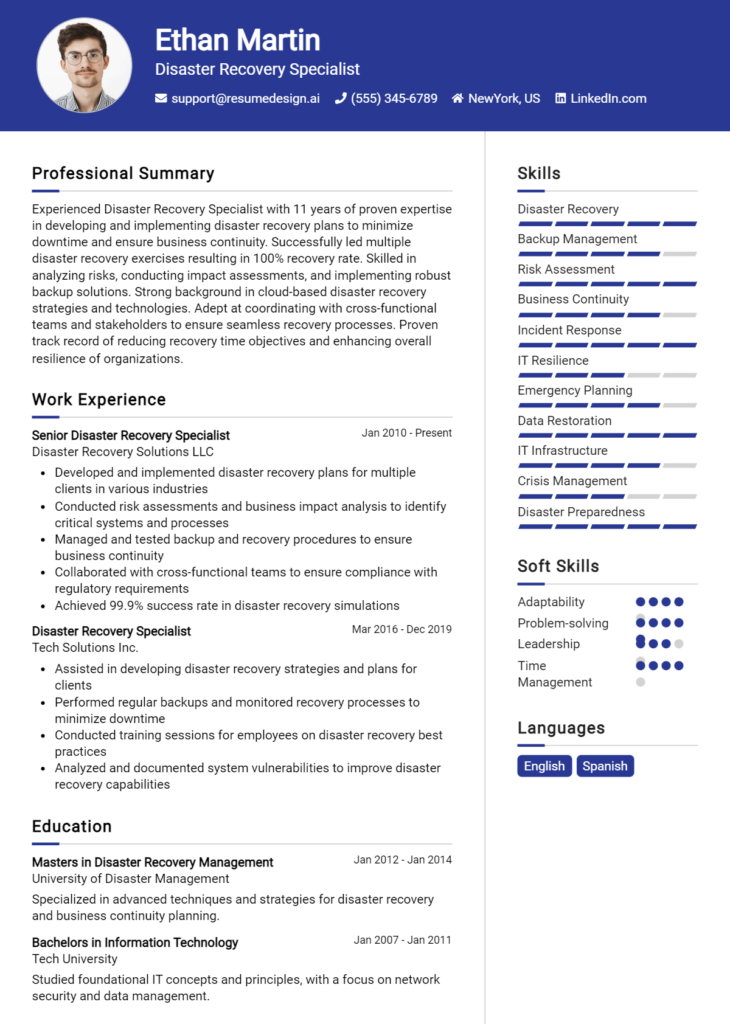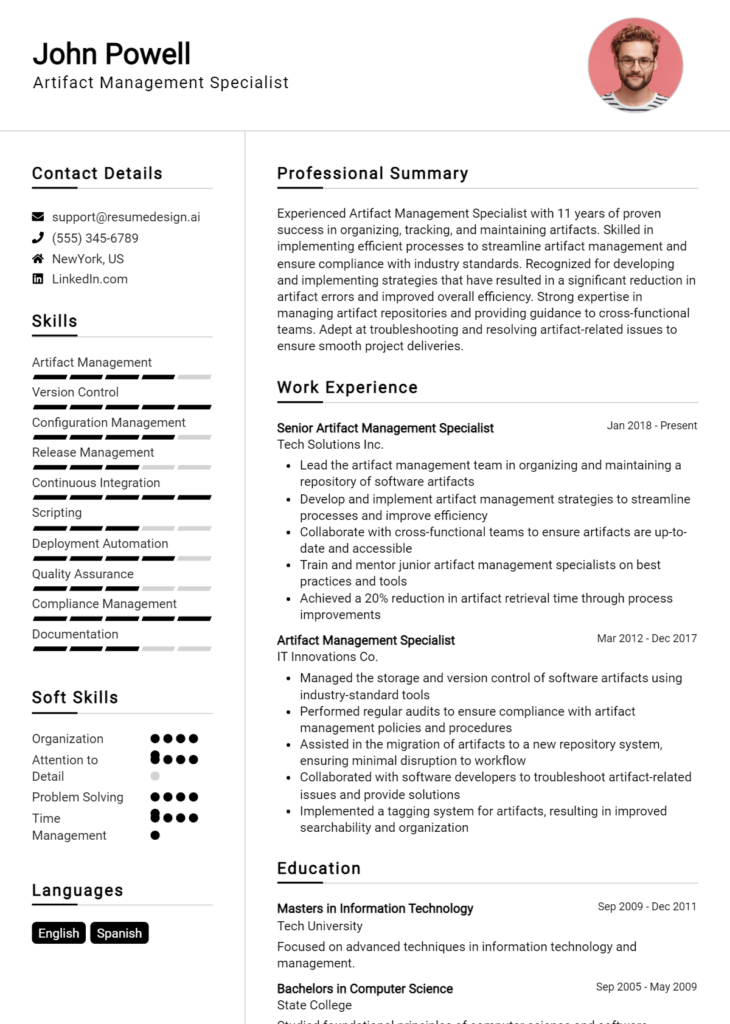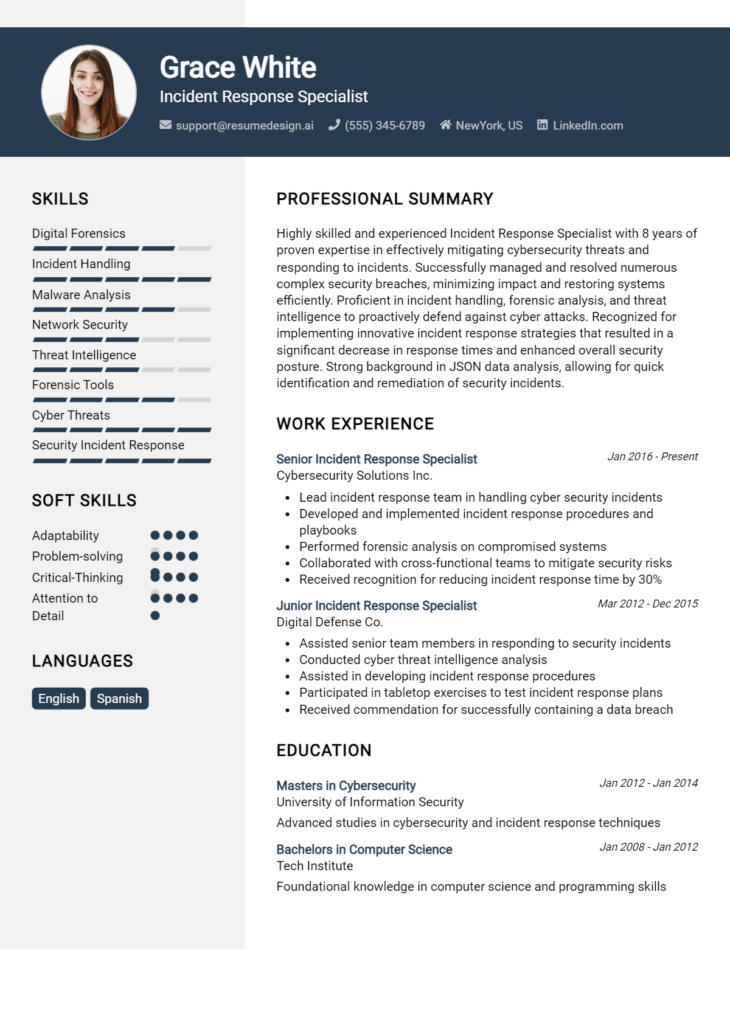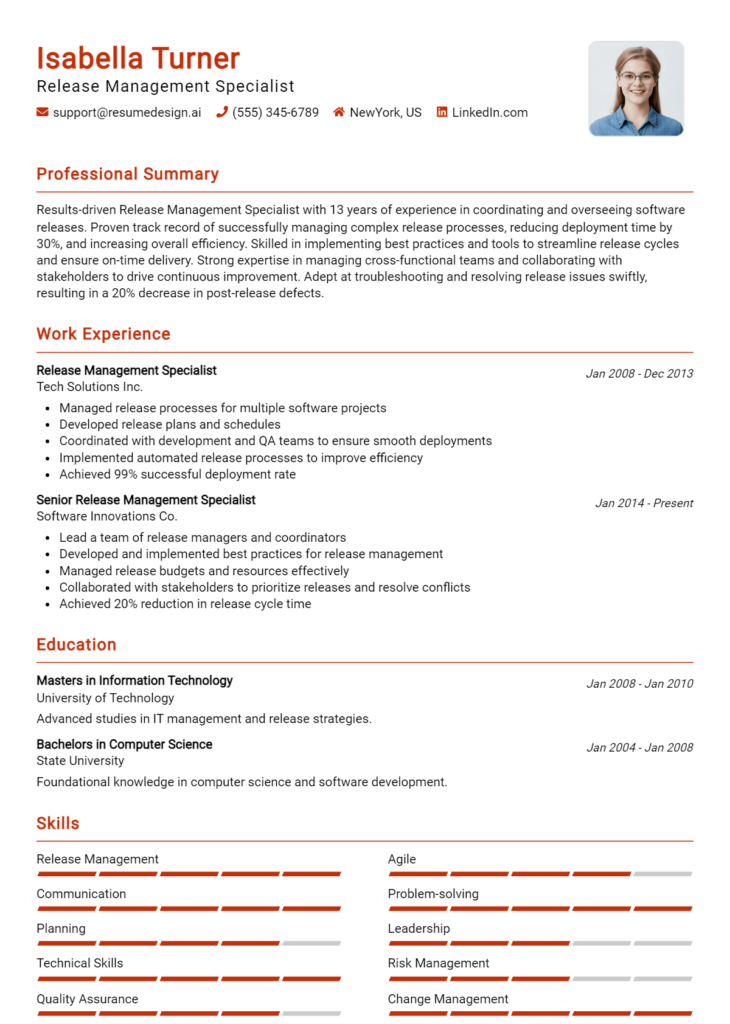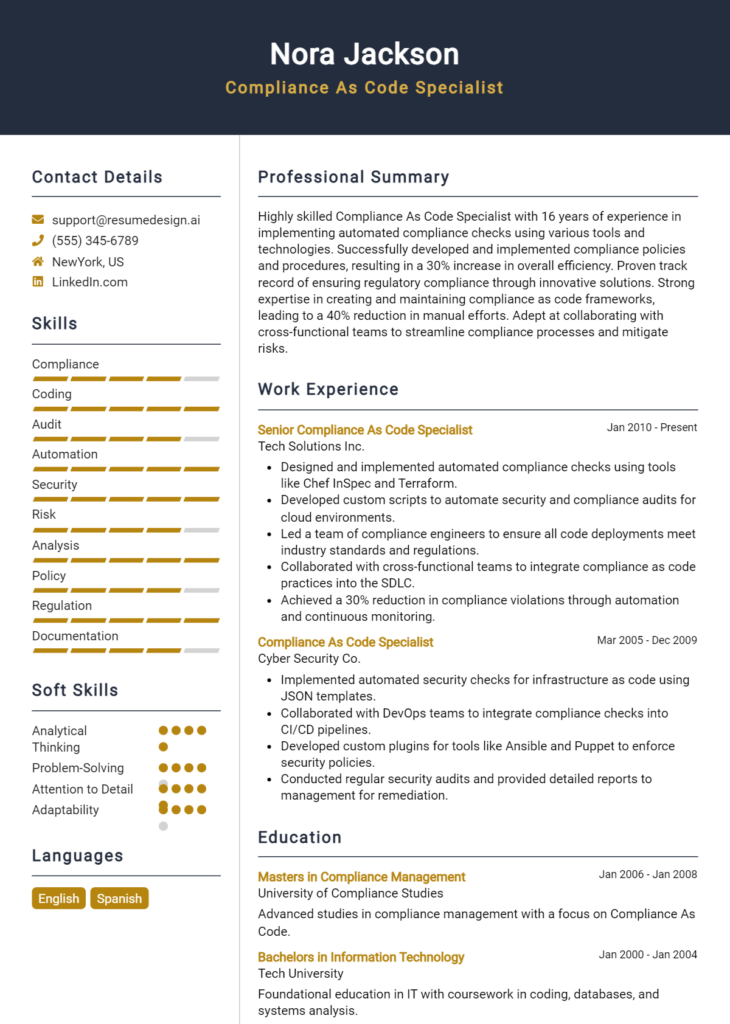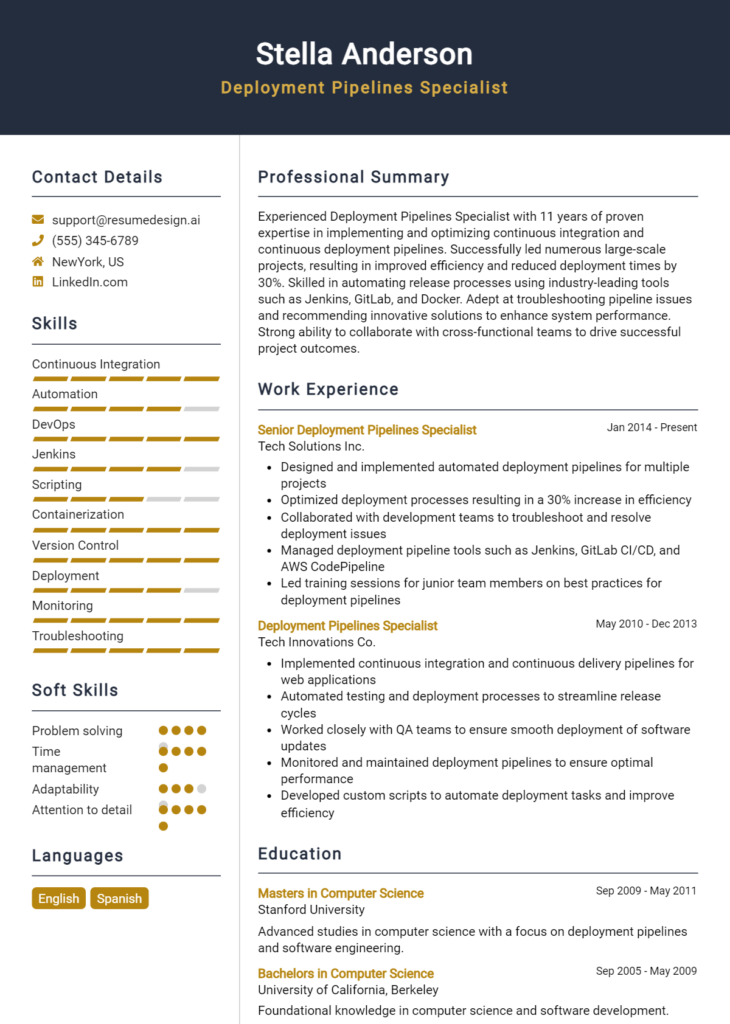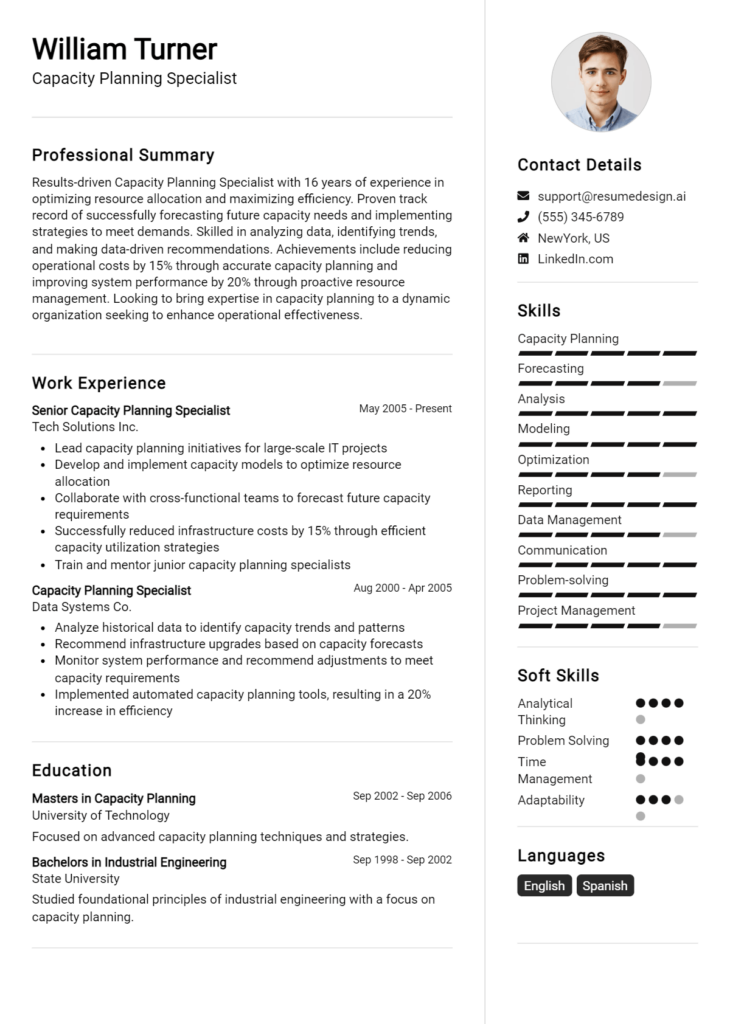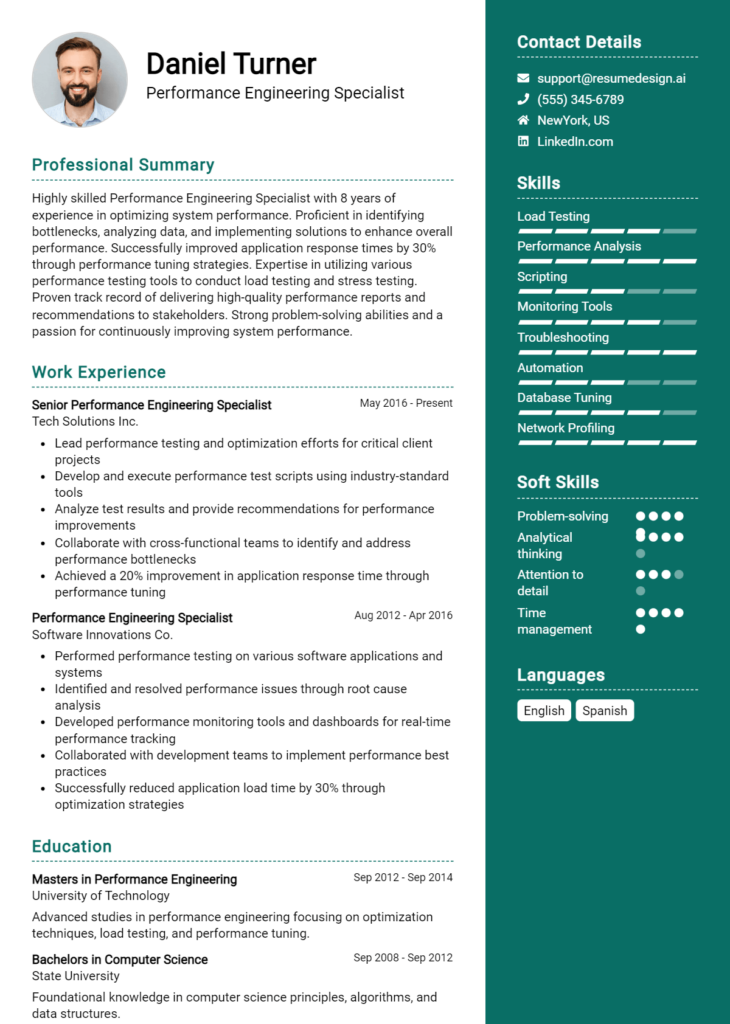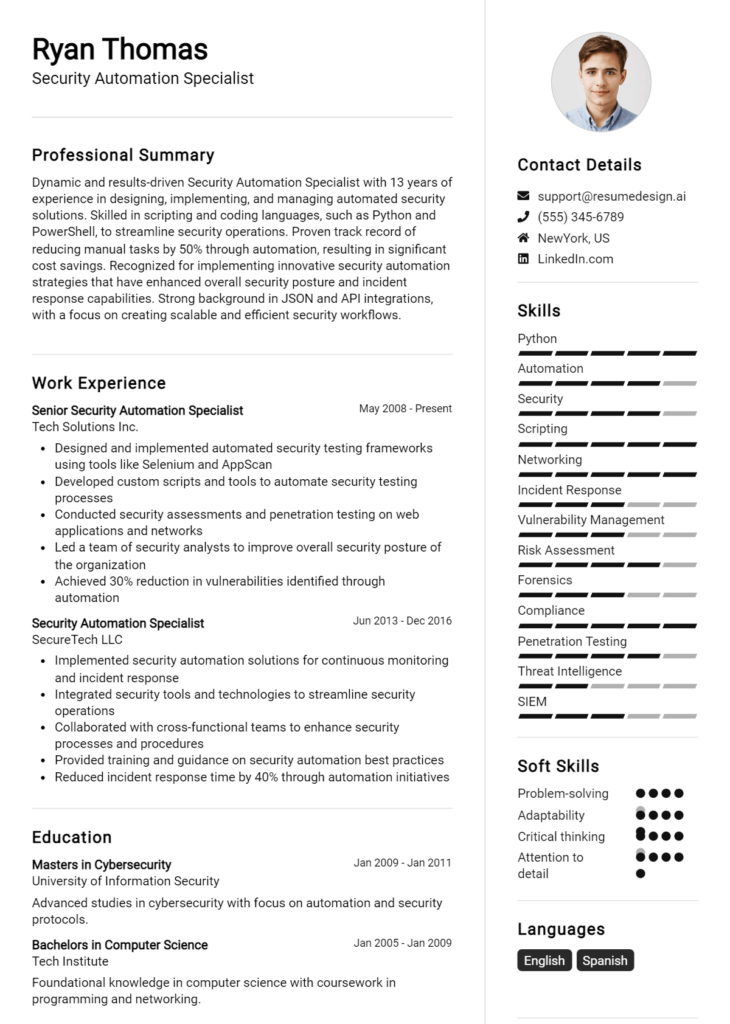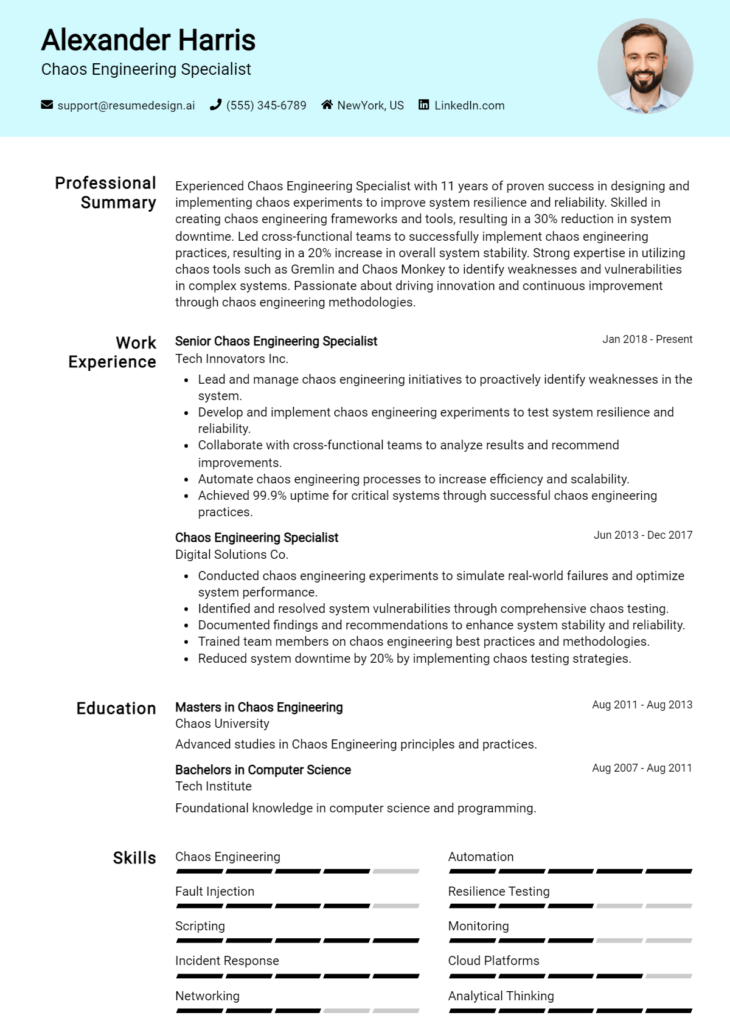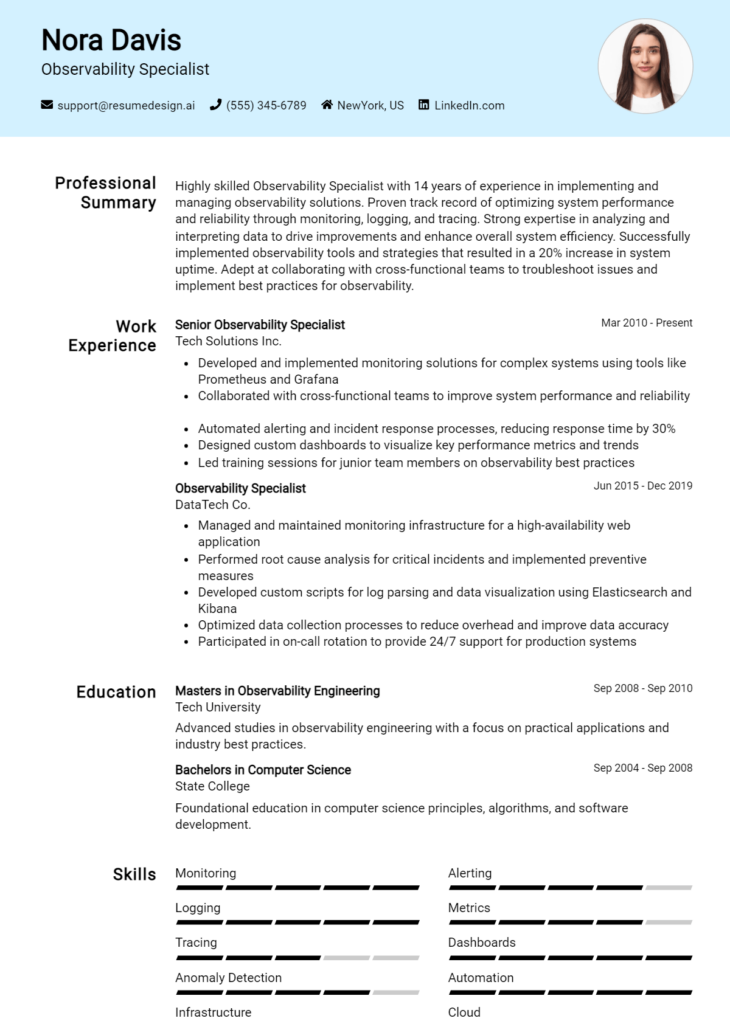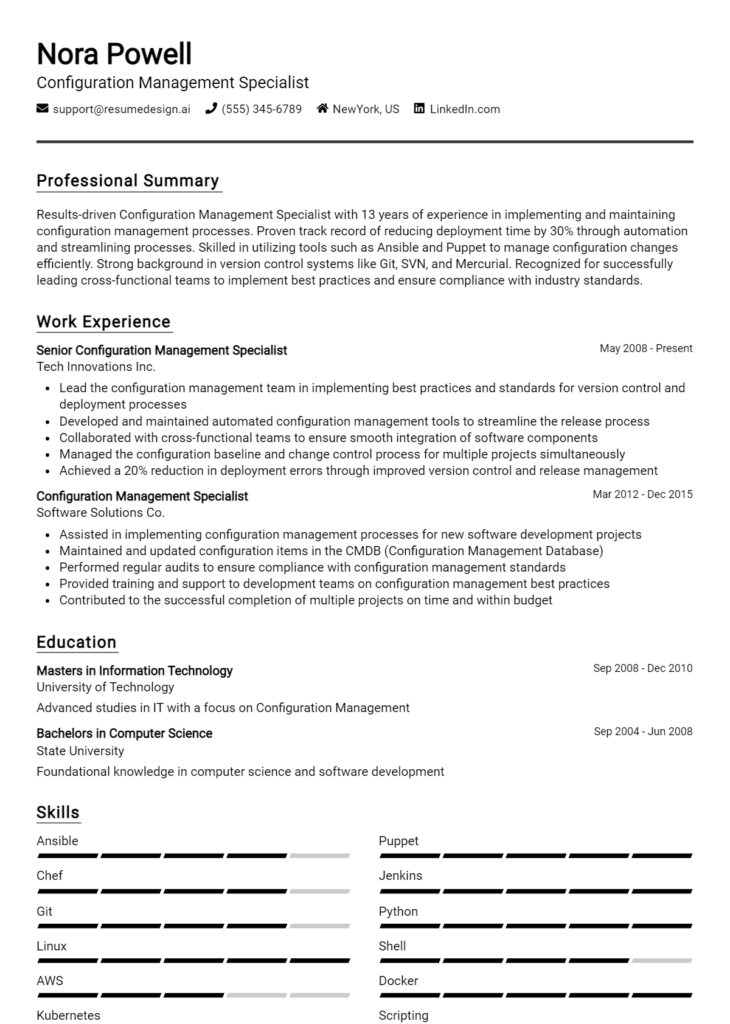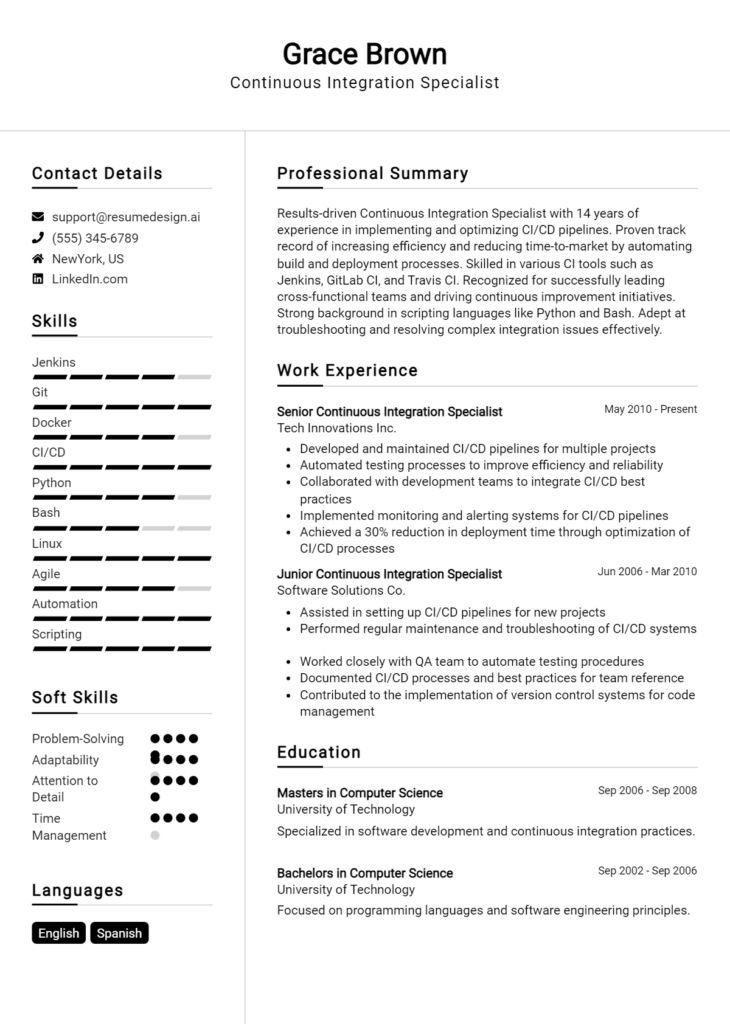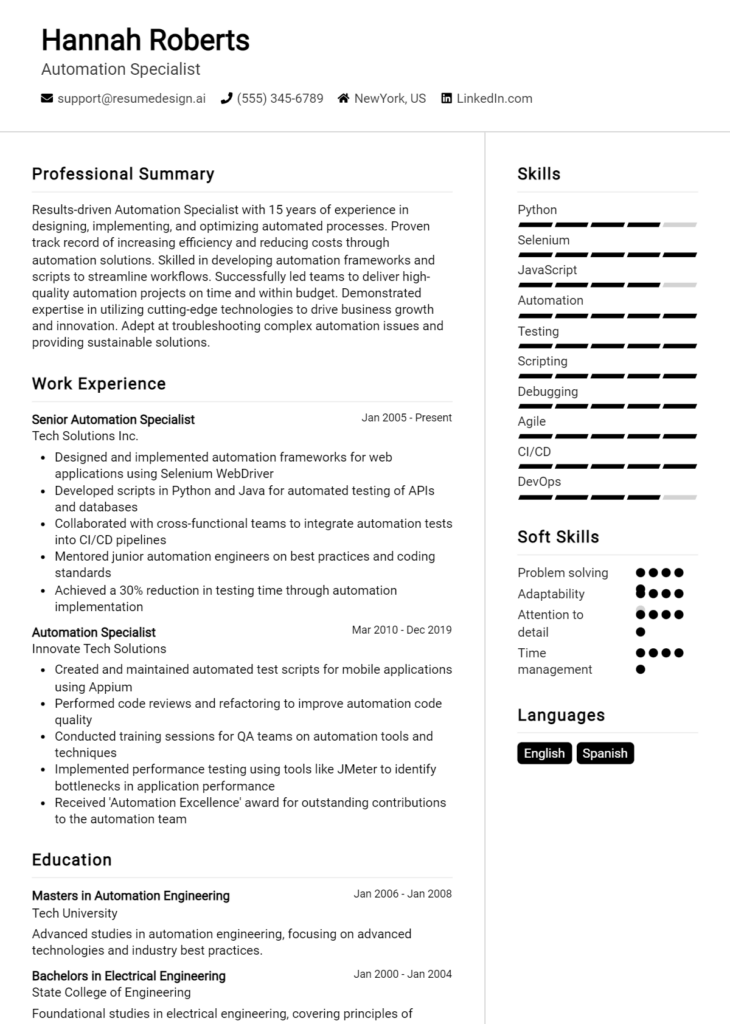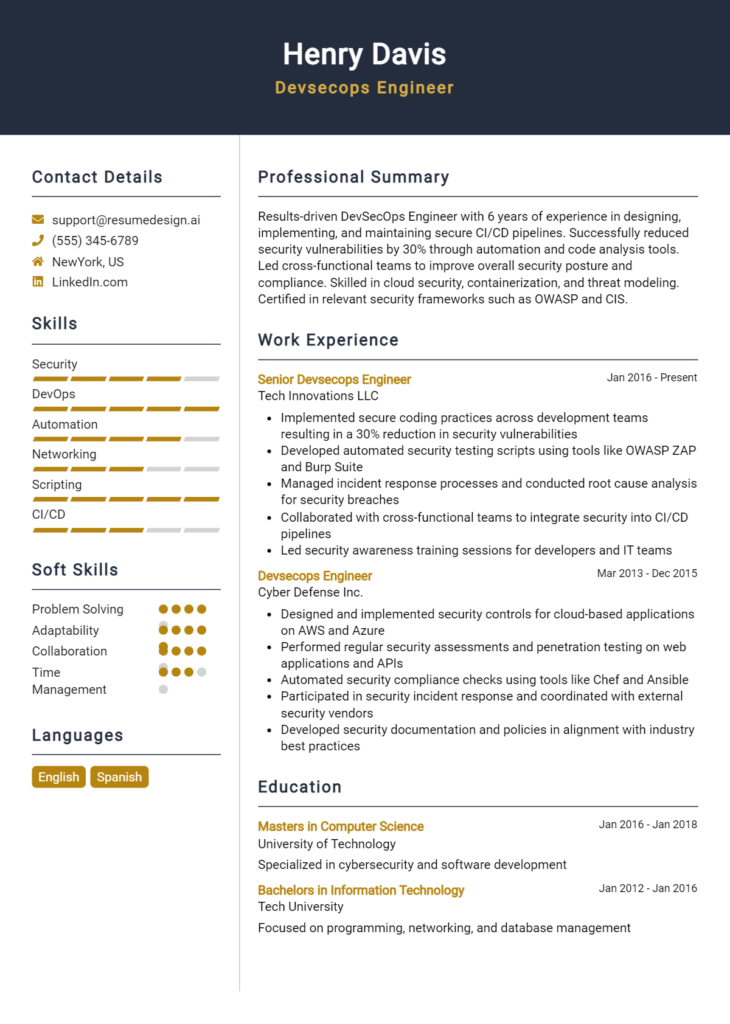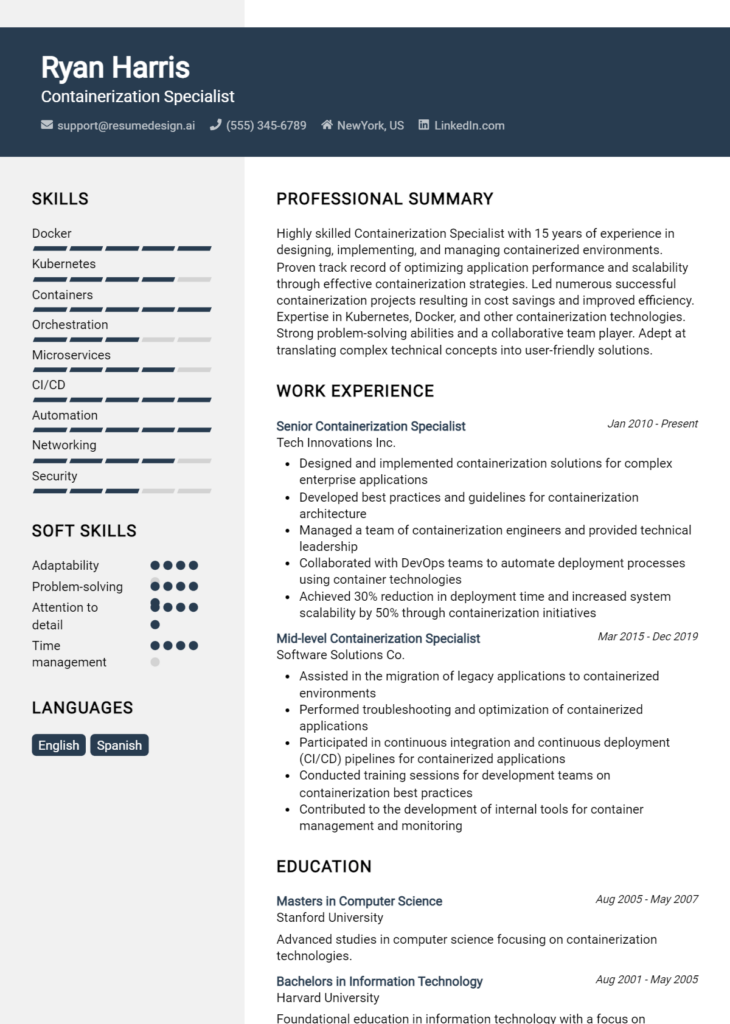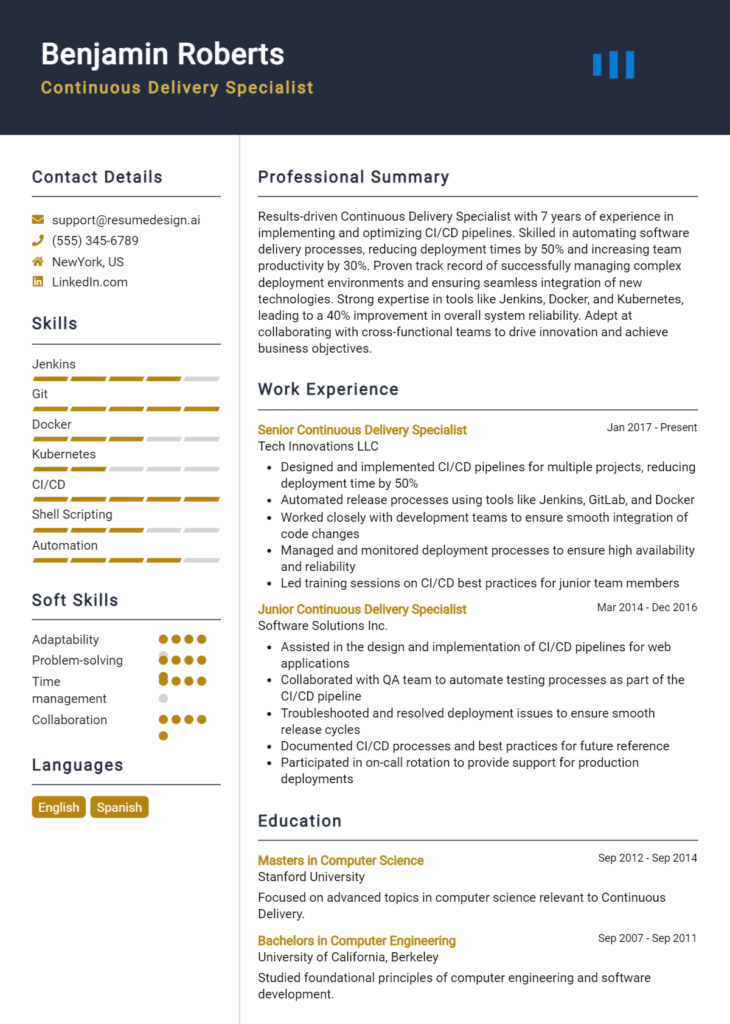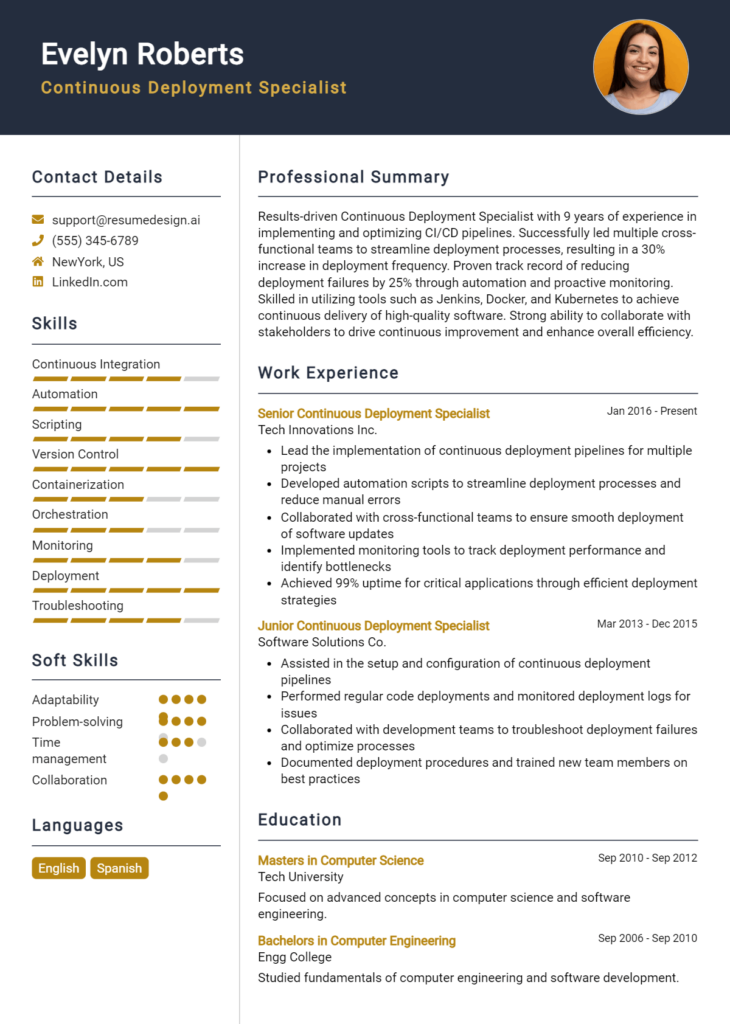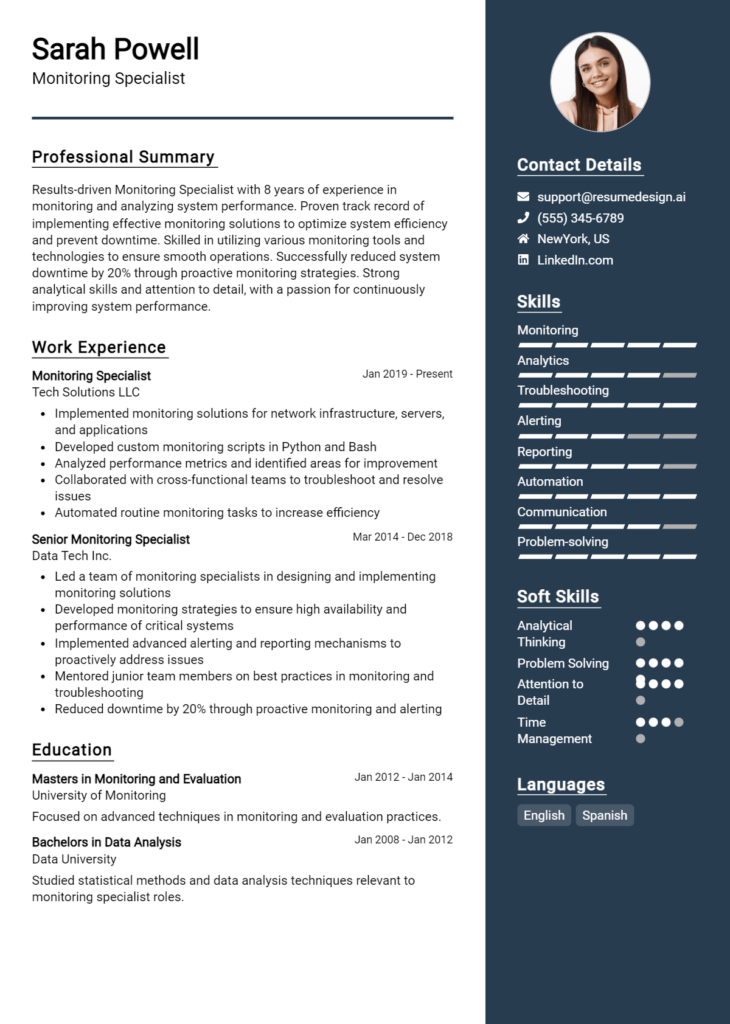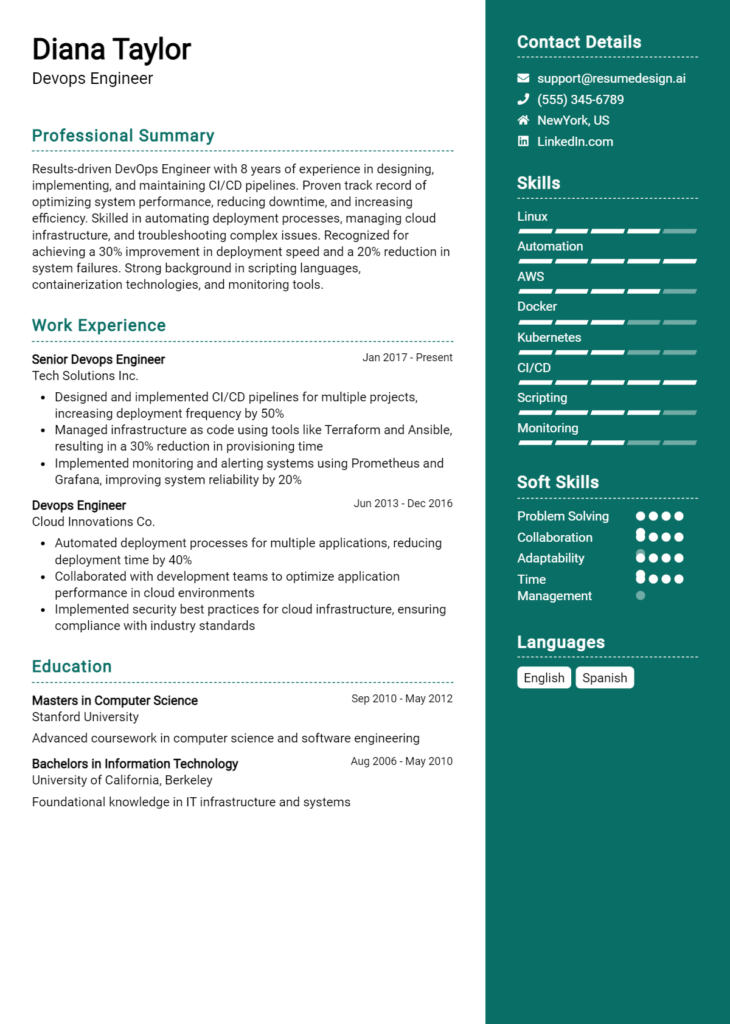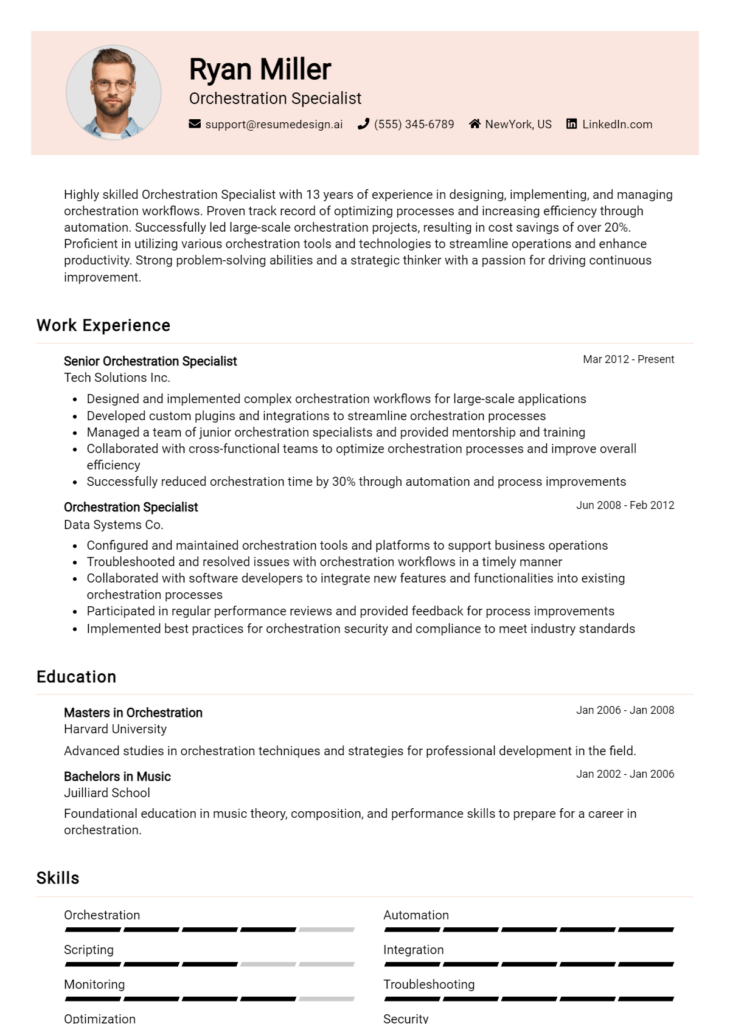Testing as Code Specialist Core Responsibilities
A Testing as Code Specialist is pivotal in bridging the gap between development, quality assurance, and operations. This role requires a strong blend of technical skills, operational expertise, and problem-solving abilities to automate testing processes effectively. Key responsibilities include designing and implementing test automation frameworks, collaborating with cross-functional teams, and ensuring software quality aligns with organizational goals. A well-crafted resume that highlights these technical proficiencies and collaborative experiences can significantly enhance job prospects in this competitive field.
Common Responsibilities Listed on Testing as Code Specialist Resume
- Design and implement automated testing frameworks.
- Collaborate with development and QA teams for seamless integration.
- Develop and maintain test scripts for continuous integration pipelines.
- Analyze test results and provide actionable insights.
- Ensure compliance with industry standards and best practices.
- Participate in code reviews to enhance testability.
- Document testing processes and update relevant stakeholders.
- Troubleshoot and resolve testing issues promptly.
- Train team members on testing tools and methodologies.
- Monitor and report on testing progress and outcomes.
- Continuously improve testing processes based on feedback.
High-Level Resume Tips for Testing as Code Specialist Professionals
In the competitive landscape of technology and software development, a well-crafted resume is paramount for Testing as Code Specialist professionals. This document often serves as the first impression a candidate makes on a potential employer, making it crucial that it effectively showcases both skills and achievements. A strong resume not only highlights your technical expertise but also reflects your problem-solving abilities and contributions to successful projects. This guide will provide practical and actionable resume tips specifically tailored for Testing as Code Specialist professionals, ensuring you stand out in a crowded field.
Top Resume Tips for Testing as Code Specialist Professionals
- Tailor your resume to match the job description, emphasizing relevant keywords and requirements.
- Highlight your experience with various testing frameworks and automation tools, specifying which ones you are proficient in.
- Quantify your achievements with metrics, such as reduced testing time, increased defect identification rates, or successful project completions.
- Showcase your understanding of software development life cycles (SDLC) and agile methodologies to demonstrate your holistic approach to testing.
- Include specific examples of your contributions to testing strategies and processes that improved product quality.
- List any certifications or training related to testing, automation, or quality assurance to bolster your qualifications.
- Emphasize collaboration skills by mentioning your experiences working with cross-functional teams, such as developers and product managers.
- Keep the layout clean and professional, using bullet points for clarity and sections that are easy to navigate.
- Incorporate a summary statement that succinctly encapsulates your expertise and aspirations in the testing domain.
- Proofread your resume thoroughly to eliminate errors, ensuring it reflects your attention to detail, a crucial trait for a Testing as Code Specialist.
By implementing these tips, you can significantly enhance your resume's effectiveness, increasing your chances of landing a job in the Testing as Code Specialist field. A polished, strategically tailored resume will not only highlight your qualifications but also demonstrate your commitment to excellence in testing and quality assurance.
Why Resume Headlines & Titles are Important for Testing as Code Specialist
In the competitive landscape of tech recruitment, particularly for specialized roles like a Testing as Code Specialist, the importance of a well-crafted resume headline or title cannot be overstated. A strong headline acts as the first impression for hiring managers, providing a snapshot of a candidate's key qualifications and suitability for the role. It should be concise, relevant, and directly aligned with the job being applied for, allowing candidates to stand out in a crowded field. By summarizing a candidate's core competencies in one impactful phrase, a compelling headline can pique the interest of employers and encourage them to delve deeper into the candidate's resume.
Best Practices for Crafting Resume Headlines for Testing as Code Specialist
- Keep it concise: Aim for a headline that is no longer than one sentence.
- Be role-specific: Use keywords relevant to the Testing as Code Specialist position.
- Highlight key skills: Focus on essential skills that align with the job description.
- Use industry terminology: Incorporate language that resonates with hiring managers in the tech field.
- Showcase achievements: Include quantifiable accomplishments to demonstrate value.
- Avoid jargon: Ensure clarity by steering clear of overly technical or ambiguous terms.
- Tailor for each application: Customize your headline to match the specific job requirements.
- Be authentic: Reflect your true capabilities and experiences to foster trust with employers.
Example Resume Headlines for Testing as Code Specialist
Strong Resume Headlines
"Certified Testing as Code Specialist with 5+ Years of Experience in Automated Testing Solutions"
“Results-Driven QA Engineer Specializing in Continuous Integration and Deployment Practices”
“Expert in Test Automation Frameworks with Proven Success in Reducing Bug Rates by 30%”
Weak Resume Headlines
“Testing Professional”
“Experienced in Technology”
Strong headlines are effective because they are specific, clearly stating the candidate's qualifications and aligning them with the job's requirements. They utilize industry-relevant terminology and highlight key skills or achievements that can attract a hiring manager's attention. In contrast, weak headlines fail to impress because they are vague and lack detail, offering no insight into the candidate's unique qualifications or expertise. By avoiding generic phrases, candidates can significantly enhance their chances of making a positive first impression.
Writing an Exceptional Testing as Code Specialist Resume Summary
Crafting an exceptional resume summary is crucial for a Testing as Code Specialist as it serves as the first impression a hiring manager will have of a candidate. A strong summary succinctly captures the attention of decision-makers by highlighting key skills, relevant experience, and notable accomplishments that align with the job role. This brief yet impactful section should be tailored to the specific position being applied for, showcasing the candidate's unique qualifications and demonstrating why they are the best fit for the role.
Best Practices for Writing a Testing as Code Specialist Resume Summary
- Quantify Achievements: Use numbers and metrics to demonstrate the impact of your work.
- Focus on Relevant Skills: Highlight technical skills and methodologies pertinent to testing as code.
- Tailor the Summary: Customize your summary based on the specific job description you are applying for.
- Keep it Concise: Aim for 3-5 sentences that succinctly convey your qualifications.
- Use Action Verbs: Start sentences with strong action verbs to convey confidence and proactivity.
- Showcase Certifications: Mention relevant certifications or training that enhance your credibility.
- Highlight Collaboration: Emphasize your ability to work with cross-functional teams or stakeholders.
- Reflect Industry Knowledge: Display understanding of current trends and technologies in testing as code.
Example Testing as Code Specialist Resume Summaries
Strong Resume Summaries
Results-driven Testing as Code Specialist with over 5 years of experience in automating testing processes, achieving a 40% reduction in testing time and increasing software release frequency by 30%. Proficient in Selenium, JUnit, and CI/CD pipelines, ensuring high-quality deliverables.
Detail-oriented Testing as Code Specialist skilled in developing and implementing test automation frameworks. Successfully led a project that improved test coverage by 50%, resulting in a 25% decrease in production defects. Strong collaborator with a track record of working alongside developers and product teams.
Dedicated Testing as Code Specialist with expertise in Agile methodologies, specializing in building robust automated testing solutions. Delivered a 35% improvement in test accuracy through innovative testing strategies and tools, enhancing overall product reliability.
Weak Resume Summaries
Experienced professional with a background in testing. Looking for opportunities to utilize my skills.
Testing as Code Specialist with some experience in automation. Interested in a challenging role.
The strong resume summaries are effective because they include specific achievements, quantify the impact of the candidate's work, and directly relate to the responsibilities of a Testing as Code Specialist. In contrast, the weak summaries are vague, lack measurable outcomes, and do not convey a clear understanding of the role or its requirements, making them less compelling to potential employers.
Work Experience Section for Testing as Code Specialist Resume
The work experience section of a Testing as Code Specialist resume is crucial as it serves as a testament to the candidate's technical skills, leadership abilities, and capability to deliver high-quality products. This section not only highlights the hands-on experience with various testing frameworks, automation tools, and coding practices but also showcases the candidate's capacity to manage teams effectively and foster collaboration across departments. By quantifying achievements and aligning the experience with industry standards, candidates can demonstrate their value to potential employers, making this section vital for standing out in a competitive job market.
Best Practices for Testing as Code Specialist Work Experience
- Use action verbs to begin each bullet point, emphasizing proactive contributions.
- Quantify results wherever possible, such as percentage improvements in testing efficiency or reductions in bug counts.
- Highlight specific tools and technologies used, demonstrating technical proficiency.
- Showcase leadership roles and team management experiences to illustrate collaboration skills.
- Align experiences with industry standards and best practices to show relevance.
- Tailor your work experience to match the job description, focusing on the most pertinent experiences.
- Include challenges faced and how they were overcome to demonstrate problem-solving skills.
- Utilize metrics to show impact, such as project timelines, budget management, or team size.
Example Work Experiences for Testing as Code Specialist
Strong Experiences
- Led a team of 5 engineers in automating regression tests, resulting in a 40% decrease in testing time and a 30% reduction in production bugs.
- Developed and implemented a continuous integration pipeline using Jenkins, enhancing deployment frequencies by 50% and improving overall product quality.
- Collaborated with cross-functional teams to establish testing standards, which increased team productivity by 25% and led to a smoother release process.
- Managed the transition from manual to automated testing for a major project, which resulted in a 60% increase in test coverage and a significant reduction in manual testing hours.
Weak Experiences
- Worked on various testing projects without specifying tools or methodologies used.
- Participated in team meetings and discussions about testing strategies.
- Assisted in writing test cases for some applications.
- Contributed to the testing process in a general manner without detailing any quantifiable results.
The examples listed as strong experiences are considered effective because they provide clear, quantifiable outcomes and demonstrate leadership and collaboration in a technical context. They specify the tools and methodologies used, showcasing the candidate's technical expertise and impactful contributions. In contrast, the weak experiences lack detail and specificity, failing to highlight significant achievements or the candidate's role in the testing process, which makes them less compelling to potential employers.
Education and Certifications Section for Testing as Code Specialist Resume
The education and certifications section of a Testing as Code Specialist resume is vital as it showcases the candidate's academic qualifications, industry-relevant certifications, and commitment to continuous professional development. This section not only highlights the foundational knowledge and technical skills acquired through formal education but also emphasizes any specialized training that aligns with the demands of the role. By detailing relevant coursework and certifications, candidates can significantly enhance their credibility and demonstrate their alignment with industry standards, making them more appealing to prospective employers.
Best Practices for Testing as Code Specialist Education and Certifications
- Prioritize relevant degrees, such as Computer Science or Software Engineering, that align closely with testing and automation principles.
- Include industry-recognized certifications like ISTQB, Certified Agile Tester, or certifications from reputable organizations related to testing frameworks.
- Detail specialized training in testing tools and languages, such as Selenium, JUnit, or TestNG, to demonstrate hands-on expertise.
- Highlight any relevant coursework that directly pertains to testing methodologies, automation, or software quality assurance.
- Maintain a clear and concise format that allows hiring managers to quickly assess qualifications and relevance.
- Update the section regularly to include recent certifications or training that reflects the latest industry trends and technologies.
- Consider including professional development courses or workshops that showcase continuous learning efforts.
- Tailor this section to each job application, ensuring that the most pertinent qualifications are presented first.
Example Education and Certifications for Testing as Code Specialist
Strong Examples
- Bachelor of Science in Computer Science, University of Technology, 2021
- Certified Scrum Master (CSM), Scrum Alliance, 2022
- ISTQB Certified Tester - Foundation Level, International Software Testing Qualifications Board, 2023
- Advanced Software Testing Techniques, Online Course, Coursera, 2023
Weak Examples
- Associate Degree in Arts, Community College, 2019
- Certification in Basic Computer Skills, Online Learning Platform, 2020
- Completed a workshop on General Business Practices, 2021
- High School Diploma, Local High School, 2018
The examples provided demonstrate a clear distinction between strong and weak educational and certification qualifications. Strong examples are directly relevant to the Testing as Code Specialist role, showcasing degrees and certifications that align with industry standards and best practices in software testing. Conversely, weak examples reflect qualifications that lack relevance to the position, such as general or unrelated certifications and degrees that do not contribute to the candidate's credibility in the testing field. By focusing on relevant achievements, candidates can effectively position themselves as qualified professionals in the competitive job market.
Top Skills & Keywords for Testing as Code Specialist Resume
As the demand for high-quality software continues to grow, the role of a Testing as Code Specialist has become increasingly vital in ensuring that applications meet rigorous standards of functionality and performance. A well-crafted resume that highlights the right skills can significantly enhance a candidate's prospects in this competitive field. Employers seek professionals who not only possess technical expertise but also demonstrate essential interpersonal abilities. By effectively showcasing both hard and soft skills, candidates can present a comprehensive profile that aligns with the expectations of potential employers.
Top Hard & Soft Skills for Testing as Code Specialist
Soft Skills
- Attention to Detail
- Problem-Solving Ability
- Effective Communication
- Team Collaboration
- Adaptability
- Critical Thinking
- Time Management
- Empathy
- Creativity
- Conflict Resolution
Hard Skills
- Test Automation Frameworks (e.g., Selenium, Appium)
- Programming Languages (e.g., Java, Python, JavaScript)
- Continuous Integration/Continuous Deployment (CI/CD)
- Version Control Systems (e.g., Git)
- Performance Testing Tools (e.g., JMeter, LoadRunner)
- Test Case Design and Execution
- API Testing (e.g., Postman, SoapUI)
- Test Management Software (e.g., JIRA, TestRail)
- Cloud Testing Platforms (e.g., AWS, Azure)
- Security Testing Tools (e.g., OWASP ZAP)
Investing time to develop and showcase these skills in your resume will help demonstrate your qualifications as a Testing as Code Specialist. Coupled with a strong work experience section, your resume can effectively convey your readiness to contribute to a team’s success.
Stand Out with a Winning Testing as Code Specialist Cover Letter
I am writing to express my enthusiasm for the Testing as Code Specialist position at [Company Name] as advertised on [Where You Found the Job]. With a robust background in software development and a passion for quality assurance, I am excited about the opportunity to contribute to your team by enhancing your testing frameworks through innovative coding practices. My experience in implementing automated testing solutions has equipped me with the skills necessary to ensure product reliability and performance while fostering a culture of continuous improvement.
Throughout my career, I have successfully collaborated with cross-functional teams to integrate testing methodologies into the development pipeline. At [Previous Company], I spearheaded the adoption of a testing as code approach that reduced the regression testing cycle by 40%. By leveraging tools such as Selenium, JUnit, and TestNG, I was able to create robust test suites that not only improved code coverage but also facilitated rapid feedback loops for developers. My dedication to maintaining high-quality standards and my ability to adapt to evolving technologies make me a strong candidate for this role.
In addition to my technical skills, I pride myself on my problem-solving abilities and my commitment to fostering collaboration among team members. I believe that effective communication is key to successful testing initiatives, and I have a proven track record of articulating complex technical concepts to both technical and non-technical stakeholders. I am excited about the possibility of bringing my expertise in testing as code to [Company Name] and contributing to the delivery of high-quality software products.
I would welcome the opportunity to discuss how my skills and experiences align with the needs of your team. Thank you for considering my application. I look forward to the possibility of contributing to [Company Name] and supporting your mission to deliver exceptional software solutions.
Common Mistakes to Avoid in a Testing as Code Specialist Resume
When crafting a resume as a Testing as Code Specialist, it's essential to highlight your skills and experiences effectively. However, many candidates make common mistakes that can undermine their chances of landing an interview. Understanding these pitfalls can help you create a compelling resume that stands out in a competitive job market. Below are some frequent errors to avoid:
Vague Job Descriptions: Failing to specify your roles and responsibilities can leave hiring managers confused about your actual contributions. Always provide clear, action-oriented descriptions of your previous positions.
Ignoring Relevant Keywords: Many companies use applicant tracking systems (ATS) to screen resumes. Neglecting to include industry-specific keywords can result in your resume being overlooked. Tailor your resume to match the job description closely.
Lack of Quantifiable Achievements: Simply listing duties without showcasing measurable outcomes can weaken your resume. Include metrics and specific examples of your impact, such as reduced testing time or improved bug detection rates.
Overloading with Technical Jargon: While technical knowledge is crucial, using excessive jargon can alienate those who may not have a deep understanding of testing frameworks. Strive for a balance between technical language and plain English.
Omitting Soft Skills: Technical skills are important, but soft skills like communication, teamwork, and problem-solving are equally valuable. Highlight how your soft skills complement your technical abilities.
Neglecting Formatting and Clarity: A cluttered or poorly formatted resume can distract from your qualifications. Ensure your resume is clean, organized, and easy to read, using bullet points and headings effectively.
Failure to Tailor for Each Application: Sending out a generic resume can signal a lack of interest in the specific role. Customize your resume for each position to demonstrate your enthusiasm and fit for the job.
Not Including Continuous Learning: The tech industry is always evolving, and not showcasing your commitment to learning can be a missed opportunity. Include relevant certifications, courses, or workshops to show your dedication to professional development.
Conclusion
As we wrap up our discussion on the role of a Testing as Code Specialist, it's essential to recognize the significant impact this position has in modern software development. We explored the key skills required, including proficiency in automated testing frameworks, programming languages, and a solid understanding of continuous integration/continuous deployment (CI/CD) practices. Additionally, we highlighted the importance of collaboration with development teams to ensure quality assurance is ingrained in the development lifecycle.
Now is the perfect time to take stock of your qualifications and experiences. If you're looking to secure a position as a Testing as Code Specialist, reviewing and refining your resume is crucial. Make sure your resume showcases your technical expertise and aligns with industry standards.
For your convenience, there are various resources available to help you craft an impressive resume. Check out our resume templates for design inspiration, use the resume builder to create a polished document quickly, and explore resume examples to see how others in the field have presented their skills. Don't forget to enhance your application with a compelling cover letter; you can find useful cover letter templates to get started.
Take action today—review your resume and ensure it reflects your capabilities as a Testing as Code Specialist, paving the way for your next career opportunity!

